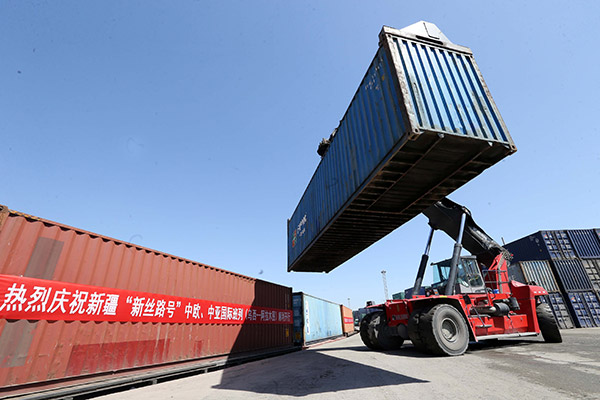Urumqi takes fast track to export success
 |
|
A cargo container is loaded onto a train at the Urumqi West Station in the Xinjiang Uygur autonomous region. [Li Xiongxin for China Daily] |
Two freight trains leave every day from Urumqi for either Central Asia or Europe.
By the end of this year, the number of locomotives setting off from the China-Europe Freight Train Logistic Center in the capital of the Xinjiang Uygur autonomous region will top 700.
In 2016, it was 135 although operations did not start until May of that year.
An average load to Alma Ata in Kazakhstan usually includes garments, daily necessities, machinery and chemical products from seven companies.
The 41-carriage train takes about five days to make the journey.
"Two freight trains depart from the center daily, a sharp increase from the once-weekly service last year," said Zhou Yanhong, deputy general manager of the Global Transportation and Logistics Company under the Urumqi Railway Administration, the center's operator.
"Our company has run 428 trains so far this year," Zhou added.
The center's plan to run 700 trains in 2017 means that 100,000 metric tons of agricultural produce from Xinjiang will depart for Central Asia and Europe.
"The center's main function is to export all kinds of agricultural and sideline products from Xinjiang to Europe," Zhou said.
But provinces in the country, which do not have China-Europe freight routes, can ship their products to the center on their way to Central Asia or Europe.
In 2013, China opened its first transcontinental freight train route. Officially known as the China Railway Express, it was a crucial component of the government's Belt and Road Initiative.
Since then, 5,500 freight train services have run between China and Europe in the past four years, China Central Television reported.
Naturally, several other Chinese cities, including Chongqing, Chengdu, Changsha, Hefei, Yiwu, Suzhou and Harbin, have launched similar services.
"By the middle of this month, 28 cities had opened 53 freight train routes to 32 cities in 12 European countries," China Central Television stated.
Customs cooperation is becoming an important issue.
Global Transportation and Logistics has already coordinated with Urumqi's customs office to simplify procedures, inspection and quarantine regulations for China-Europe freight routes.
"Each train is currently managed by different logistic companies, which sometimes leads to empty carriages and a waste of resources," said Yuan Jiangwei, a Urumqi customs office official.
"The office has cooperated with other customs bureaus in Chongqing and Zhengzhou to pilot a freight train integration program, which is expected to be implemented by November," Yuan added.
In taking this option, each service will become more streamlined and efficient.
This in turn will reduce costs and make the China Railway Express more sustainable in the long term.
"In the future, each carriage of the train will be a management unit," Yuan said. "Trains with empty carriages can link up with other (locomotives) bound for the same destination.
"This will greatly reduce the logistics costs and make the train route more lucrative and sustainable," Yuan added.
Online technology will help shorten the process, while a credit system for companies sending goods abroad is also being considered.
Again, these initiatives will go a long way to speeding up the operation, as well as making the network more profitable.
"In order to provide a better business environment for enterprises seeking opportunities in the Central Asian and European markets, the procedure for inspection and quarantine will be done online," said Chen Shihua, deputy director of Urumqi Entry Exit Inspection and Quarantine Bureau. "This will shorten the whole process from a couple of days to several minutes.
"We also plan to establish a credit system for enterprises, so those with good credit will be exempt from inspection," Chen added.
In April, an agreement was signed by the rail authorities of China, Belarus, Germany, Kazakhstan, Mongolia, Poland and Russia to deepen cooperation.
Under the deal, countries will establish an information sharing platform to ensure transport safety, according to the China Railway Corporation.

























